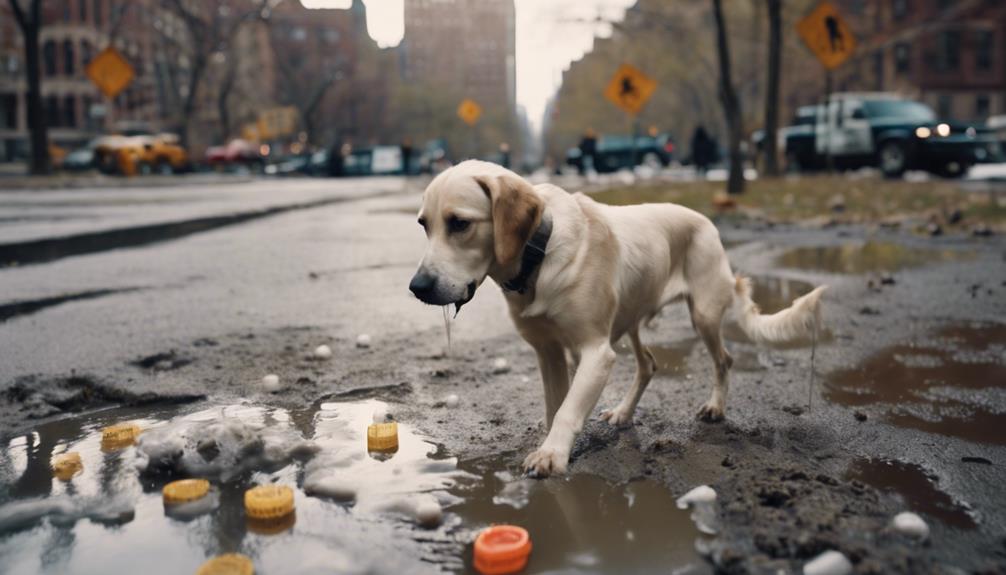In the bustling metropolis of New York City, the recent uptick in leptospirosis cases has sparked a wave of concern among pet owners, prompting a closer look at the implications of this bacterial disease.
As the city grapples with containing the spread of this illness, understanding the intricacies of leptospirosis becomes paramount for safeguarding the health of not just our furry companions but also ourselves.
Stay tuned to discover the crucial insights on how to navigate the risks posed by this infectious agent and the measures to shield your beloved pets from its potential harm.
Key Takeaways
- Leptospirosis outbreak in NYC linked to contaminated water in McCarren Park.
- Early detection vital for dog treatment to prevent severe symptoms.
- Consider leptospirosis vaccine for dogs in high-risk areas.
- Supervise outdoor activities to minimize exposure and protect pets from infection.
Leptospirosis in NYC: Understanding the Bacteria
Leptospirosis, a bacterial infection caused by the Leptospira bacteria, has recently gained attention in New York City due to a concerning outbreak affecting pets. The Leptospira bacteria are prevalent in warm, rainy regions globally, with infection primarily occurring through contact with infected animal urine.
In dogs, symptoms of leptospirosis include liver and kidney damage, weight loss, lethargy, and jaundice. Early detection is vital for successful treatment using antibiotics. While rare, dogs can transmit the disease to humans.
The recent outbreak in McCarren Park, where four dogs succumbed to leptospirosis, was linked to contaminated standing water, likely from rats. Prompt closure of the park for repairs and rat extermination was initiated, with ongoing investigations focusing on containing the potential outbreak.
Recognizing Symptoms and Early Detection
Early recognition of symptoms and prompt detection are crucial in effectively managing leptospirosis in pets. Common signs of leptospirosis in dogs include fever, muscle pain, vomiting, diarrhea, lack of appetite, and lethargy. In severe cases, dogs may also experience jaundice, bleeding disorders, and organ failure.
If your pet shows any of these symptoms after potential exposure to contaminated water or infected animals, seek immediate veterinary care. Diagnosis typically involves blood tests to detect the bacteria or antibodies. Early treatment with antibiotics is essential to prevent complications and improve outcomes.
Protecting Your Pets From Infection

To safeguard your pets from potential infection, implementing preventive measures is paramount to their well-being and health. Leptospirosis in dogs can be prevented by minimizing exposure to contaminated environments. Avoid allowing your pets to drink from or come into contact with standing water in high-risk areas, as this can be a source of infection.
Supervise outdoor activities to prevent interactions with unfamiliar animals that may carry the bacteria. Additionally, practicing good hygiene by cleaning up after your pets and seeking prompt veterinary care if they show any signs of illness post-outdoor activities can help mitigate the risk of infection.
Vaccination and Preventive Measures
Implementing proper vaccination protocols and preventive measures is essential in safeguarding pets against the threat of leptospirosis and ensuring their overall well-being. To effectively protect your furry companions, consider the following recommendations:
- Leptospirosis Vaccine: Consult with your veterinarian about the leptospirosis vaccine, especially if you reside in or frequent high-risk areas.
- Limit Exposure: Minimize your pet's contact with potentially contaminated areas and supervise outdoor activities to prevent infection.
- Water Safety: Prevent pets from drinking standing water outdoors and interacting with unknown animals to reduce the risk of transmission.
- Prompt Veterinary Care: Seek immediate veterinary attention if your pet displays any symptoms of illness after outdoor excursions to enable timely diagnosis and treatment.
Related Pet Health Concerns to Consider

Considering the broader spectrum of pet health, it is imperative for pet owners to be aware of various related health concerns that can impact their furry companions' well-being.
In addition to leptospirosis, pet owners should stay informed about other significant diseases affecting animals. This includes being aware of recent dog flu outbreaks and ensuring up-to-date vaccinations. Understanding the risks of rabies in cats and the necessary preventive measures is crucial.
Knowledge about parvo in dogs, its treatment options, and preventive strategies can also help in safeguarding pets. Furthermore, protecting pets from salmonella outbreaks carried by songbirds and educating oneself on heartworms in dogs are essential aspects of maintaining overall pet health and well-being.
Conclusion
In conclusion, understanding the risks and symptoms of leptospirosis is crucial for pet owners in urban environments like NYC.
By recognizing the signs early and taking preventive measures such as vaccination and avoiding contaminated water sources, you can protect your furry companions from this potentially deadly bacterial infection.
Stay informed, stay vigilant, and prioritize your pet's health and well-being.




